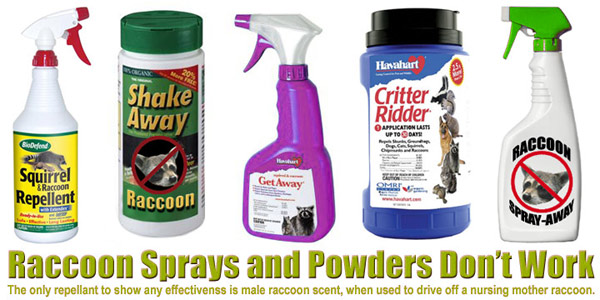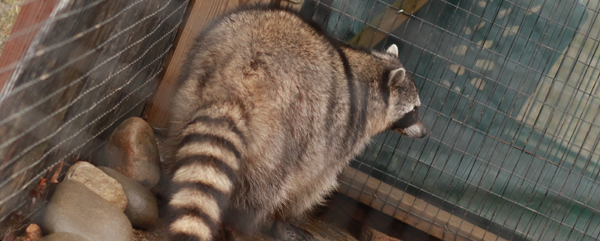- info@wildlife-removal.com
Call us for help in your town
Wildlife Removal Education
Raccoon Repellent to Keep Them Away
Need raccoon removal in your hometown? We service over 500 USA locations! Click here to hire us in your town and check prices - updated for year 2020.
Is there any effective repellent for sale that will keep raccoons away from your house, property, or attic? The answer is a resounding NO. Yes, many are sold, and if you found
this web page, you've probably also found a whole bunch of other web pages hawking cheap solutions. My only response is that if you want to try out any of those raccoon deterrent
products, be my guest. After you discover for yourself that they don't work, you'll have to use an actual solution - namely trapping and removal of raccoons. Click here to read
my raccoon trapping tips if you want to learn how to do it right.
Click here for a nationwide list of 100's of professional raccoon trappers serving all 50 states.
Why doesn't raccoon repellant work to keep them away? Well, they're mammals. It's not like an insect, where you can use a special type of poison that they'll bring back to the queen and kill the hive.
Mammals like you and me don't really respond to scent (or noises) to make us leave our home. The bad smell of mothballs or ammonia or a loud radio or high-pitch noise machine might be a bit annoying, but
in the raccoon-eat-raccoon world of survival, a mere annoyance won't make you pick up and leave your house. Seriously: if someone spread mothballs in your house, would you pack up and move out? And some
sellers claim that predator urine, like coyote urine, will make them scared and run away. Neh. Raccoons don't give a crap. First of all, they're pretty fearless, and second of all, they're not dumb.
It just doesn't work that way - urine scent doesn't repel raccoons. Raccoon Prevention Tips

Raccoon spray and powder repellent products sold at places like Lowe's, Home Depot, Amazon, or Wal-Mart.
How do you keep away raccons? Ultimately, you've got to actually remove them. This can be accomplished via either trapping or exclusion
techniques, such as one-way doors
that let animals get out, but not back in. Many people have asked me about repellents, from mothballs to coyote urine to ultrasonic sound machines, and I do know that many of them are sold, and in my many years in the field, I have tested
several of them, and gotten MANY reports from homeowners who have tried them out, and these products FAIL. They are bogus, they are a waste of time and money. They are gimmicks so that someone has something to sell. Go ahead and try
them out if you want - meanwhile, the animals in the attic will just keep causing damage. Only real, physical removal of the animals will take care of the problem. This process varies a great deal by animal, time of year,
architecture, and so on. I've written many wildlife trapping guides on this site, but the bottom line with animals in the attic is that you're best off, for your property's sake and for safety and even legal reasons, to hire a
professional wildlife removal company.
Other raccoon articles I've written:
raccoons in the attic -
how to get rid of raccoons -
raccoons in the pool -
how to trap raccoons -
raccoon bait -
raccoon poop -
raccoon removal -
raccoon in chimney -
raccoon pest control -
raccoon damage -
raccoon in the house -
sound devices for raccoons
Whether you have had a first-hand experience with raccoons in your home or you only heard of the damage done to a neighbor’s house, you certainly don’t want those nuisance animals anywhere around your house. A host of different raccoon repelling substances are on sale in local stores for this purpose. In the same vein, many folks swear by homemade raccoon repellants, with preparation methods readily available for any do-it-yourself home owner.

Raccoon repellants basically aim to drive raccoons away from your yard by leveraging on their sharp sense of smell. Let’s take a look at some raccoon repellants available in stores:
Raccoon Eviction Fluid: its components include the urine and body secretions of a matured male raccoon. Habitually, male raccoons feel threatened by the young species and will kill them off to reduce competition. This is one of the reasons why a mother raccoon hides her babies away from sight in attics and other closed spaces. The raccoon eviction fluid is very effective in this regard and if spread liberally in the attic and its entry holes, will likely discourage a female raccoon from keeping her babies in such spaces.
Predator Urine: a lot of raccoon solutions sold online are touted to contain the urine of critter predators like fox, coyote, bobcat, and even bear. These products come in liquid or granule form and may require mixing with other ingredients. However, predator urine-based products do not have a great track record or success rate in repelling raccoons. Properly sourced, straight urine has a slightly better chance if applied to attic or chimney space. That is of course, if you can pull it off.
Moth balls: they incorporate the chemical, Naphtalene, which has a very strong smell to repel almost every specie of raccoons. That is what the labels say. In actual fact, it has been proven severally that wildlife are not affected by the scent of moth balls. Never mind what the manufacturers claim. The use of moth balls as repellant is strongly discouraged as they do pollute the environment and pose a risk of cancer. This is the kind of crappy product you find at Lowe's, Home Depot, Amazon, or Wal-Mart.
The Truth About Using Mothballs & Ammonia To Get Rid of Raccoons
Hot Pepper Oil: the application of very hot pepper oil, spray, or paste does the trick a lot of times, keeping not only raccoons, but almost any mammal from treated surfaces. It should be applied by brush or spray on entrance points into the attic or other raccoon-attracting structures in the house. The utmost care is however required, for anyone handling the hot pepper, as any contact with skin, eye, or air passages cannot auger well for them.
Ammonia: ammonia-soaked rags are commonly recommended to solution-seeking home owners because of the repugnant smell that will surely chase the unwanted critters away. It is however, pertinent to note that an odious smell is not enough to deter an animal fighting for survival. Those die-hard raccoons will overcome their aversion for the odor when food and shelter are at stake. Thus this solution, like moth balls, rarely works. The same applies to other strongly-scented fluids like bleach and vinegar. Ammonia is particularly distressing to the eyes and nose of raccoons and has a better chance at being effective when applied in an enclosed space.
Plants: People want to buy raccoon repellent plants to keep raccoons away naturally, and which is a repellent that is safe for dogs. But sorry, there are no such actual plants that do a good job. Not even poison ivy or thorny brambles!
High-pitch Noise Gadgets: many ultrasonic sound gadgets are sold by stores with the promise of warding off raccoons with their high frequency sounds. These noise machines however, are largely ineffective in affecting raccoon, or any other animal’s behavior. They never solve the problem and have furthermore been classified as fraudulent by the Federal trade Commission (FTC).
Strobing Light Machine: these lights flash and strobe with the intent of annoying the raccoons into moving out of the attic. Also largely ineffective, they have been observed to not have any effect on raccoon behavior.
Generally speaking, the use of raccoon repellants is not an effective way to deal with your raccoon problems, even though they work for specific situations. They work best in combination with other control measures. In all, the most effective method for taking your home back still remains raccoon inspection, trapping, and removal by a wildlife professional.
Real Raccoon Situation: I have recently had trouble with raccoons in my attic. At first I bought some mothball granules, but they didn't do anything, so this past Tuesday I paid an animal control company $250 to come
out to set traps. That fee covered the 1st racoon caught and to find and seal up any entrances. I am also being charged $55 for each additional critter after the first. As of today (day 4) there has been 1 raccoon and 2
opossums caught. I also have a creek that runs behind my house and am afraid that there will be more critters caught than I can afford. Also, I did see the raccoon that was caught but never saw the opossums. He just told
me about them because I am usually at work when he comes. I am a single mom and I am on a very tight budget and cannot afford for to many more critters to be caught. At this point, I already owe him another $110 and still
have no idea what damages have occurred in the attic or what kind of expenses I am looking at on that end. Also, my home owner's insurance does not cover animal/critter damage. My question now is: What is the normal amount
of time for these traps to be set out before he goes into the attic to check for nests, assess the damage and start sealing up the holes? Thank you..............Billie
My response:
Your trapper should have gone into the attic FIRST THING. It's essential that the young are found. They can be used as bait to trap the mom, and the whole job is done very quickly. The hole should be sealed just as soon as
they're all out. Paying for those opossums caught on the ground is a waste of money. Have your trapper target only the raccoon in the attic! This isn't hard to do.
Article topics include: Raccoon deterrent - How do I keep away raccoons - Does a repellent keep raccoons away from my property - Can a deterrent get rid of raccoons in my attic - Raccoon spray and raccoon powder repellants.


















